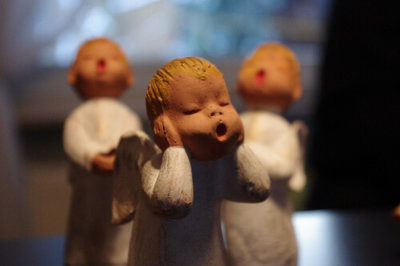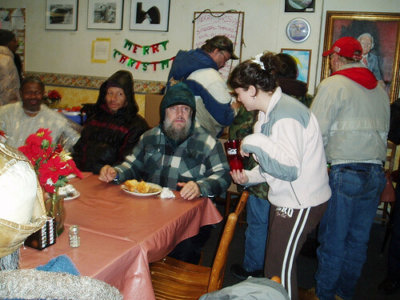The Christmas Blues – Why They Happen and How to Manage

By: Ma1974
by Andrea M. Darcy
Christmas cheer is a great concept, but having the Christmas blues is the realistic experience for many.
A recent survey discussed in the Psychiatric Times found that 67% of those with depression report that it worsens in the festive season.
What is behind holiday depression?
Why is it that the holidays make feeling okay so hard?
1. Far too much ‘comparison shopping’.
And we aren’t talking about actual gifts here.We compare our lives to an unrealistic representation of shiny, perfect Christmas experiences we are bombarded with by the media. We compare our holidays to those of others, like our colleagues and friends.
And if that is not enough, this Christmas is then held up to the past ones. The one before the divorce, or when we were in love and not single, or when our mother was still around and we weren’t grieving, or when we were younger, happier…
2. Stress is higher.
There are simply more things on the to-do list. More get togethers, more gifts to buy, more meals to plan.
Add to this that we tend to drink more alcohol (a survey shows 61% of Brits who drink indulge far more during the festive season) and eat less discriminately. Both of which can lead to sluggishness and disrupted sleeping patterns, so we aren’t even well equipped to deal with the stress.
There is also the stress of having to see family we don’t get along with, which can cause weeks of worry and the Christmas blues.
3. End of year anxiety leads to negative thinking.

By: Chris Wolff
With New Years pending, you might be criticising yourself for what you did or didn’t do with your year.
Gratitude goes out the window as suddenly we don’t have the right relationship, the right house, the right budget…
4. Loneliness is a common trigger for the Christmas blues.
Not having a family around you this time of year can make you feel like a leper, no matter how much you claim you like the time to yourself.
And because loneliness is not even about being alone, but about not feeling connected to others? You can alternately find yourself surrounded by ‘friends’ and ‘family’ but feeling entirely lost.
How to pull through the Christmas blues
So what can you do if the Christmas blues are nipping at your heels?
1. Be honest with yourself about how you are feeling.
Trying to deny how you are feeling means you can’t start to seek solutions. It also means you miss the chance to realise if your mood issue is actually something like seasonal affective disorder (SAD), which can be treated.
And if you are trying to hide from how you feel by overeating, or using drugs or alcohol, you will just be making things worse. (Read our article on alcohol and depression to learn how alcohol can actually be the cause, not cure, for your low moods).
2. If you can only manage one thing, go for self care.

By: Funk Dooby
If one thing slips mist during the holidays, it’s a good self-care routine. This is a big red flag if you suffer from low moods, because self-care is now understood to be a pillar of psychological wellbeing.
So go against the grain and keep your routine going. Exercise is proven to help moods. Eating well also matters, affecting your energy levels. And watch your alcohol intake.
Don’t forget a cornerstone of self care is taking time for yourself, even if that means saying no to yet another party.
3. Get into shades of grey.
No, not THAT shades of grey – but grey thinking. The kind of negative thinking that leads to depression tends to be extreme, black and white thinking that lacks reason.
Take a tip from cognitive behavioural therapy (CBT). When you have a negative thought, force yourself to think of the exact opposite, then write down a thought that is between the two that you can support with real facts.
For example, if you think, ‘nobody cares that I am alone at Christmas”, the exact opposite is “everyone cares that I am alone at Christmas”, and the middle ground is, “you know my friend called the other day, and Jack at work asked if I’d be okay over the holidays – some people do care about my Christmas”.
4. Push yourself to get out and be active.
There are times when self-imposed isolation with a tub of ice cream and a series to binge is just the ticket. But at Christmas we stay home, turn on the TV, and are faced with images of joy and peace that can make us feel worse. Plus, we have time off work, so there is no workday ahead to stop of from spiralling too much.
Find things to do that aren’t Christmas- y and force yourself out, whether that is the gym, a long walk, or even just taking yourself to a movie.
5. Consider volunteering to stave off the Christmas Blues.
Volunteering is proven to help depression. And it’s hard to compare yourself in a bad light or feel negative when you are helping others who are less fortunate.
6. Forget presents, be present.
Remember Scrooge? And the hauntings by the ghosts of Christmases past and future?
Many of us don’t need ghosts as we haunt ourselves, moping about the past we can’t change and the future we can’t control.
The place it is hardest to be miserable in is often the present moment. What in this exact moment, right now, is actually ok? What, right in front of you, can you see, smell, hear, or taste that is nice? Are you in a nice room, with nice music, and nice food in the stove? Are these not things to be happy about?
This is essentially mindfulness, a practice of being aware of your present thoughts and feelings that many therapists now use with clients due to its effectiveness at improving calm and wellbeing.
7. Don’t just put up the tree, put up your boundaries.
If you aren’t alone but are depressed because of family stress, this one is crucial.
One of the main reasons we fall into low moods is low self-esteem. And often what is behind low self-esteem is knowing that we’ve let people walk all over us again, ie, poor personal boundaries.
And always overdoing it to please others is also exhausting! See the holidays as a great time to practice saying no to what you don’t want and learning to delegate and say yes to you.
 Andrea M. Darcy is a health and wellbeing expert and writer. She has often had the Christmas blues herself! Find her on Instagram @am_darcy
Andrea M. Darcy is a health and wellbeing expert and writer. She has often had the Christmas blues herself! Find her on Instagram @am_darcy






every year for as long as I can remember I suffer from extreme sadness during the Christmas/New Year festive period. I’d like to share this article on Social Media but I can’t find a link.
Hi Lisa, you are not alone with this! A lot of our clients report holiday blues. We made a shortened link for you http://bit.ly/glumxmas